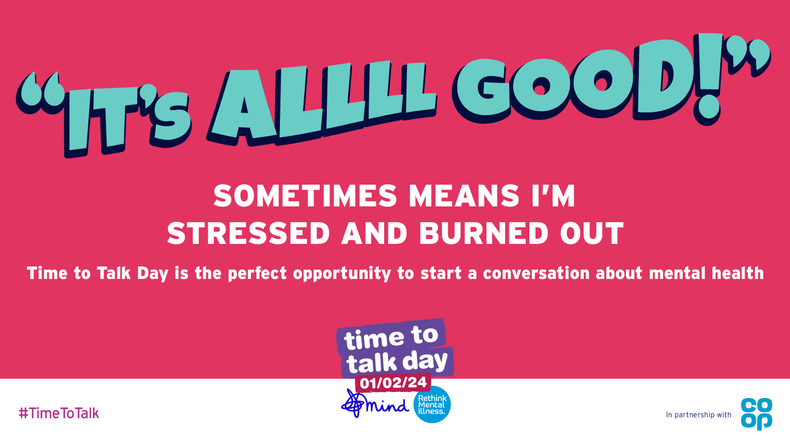5 Reasons Why Time to Talk Day is Important

Time to Talk Day, the first Thursday in February focuses on communities coming together for the nation’s biggest mental health conversation.
New data released reveals the nation is putting on a ‘brave face’ to avoid talking about mental health during difficult times. Although sometimes it may feel easier to tell people we’re ‘fine’, bottling things up and putting a brave face on can have a negative impact on our wellbeing.
Here are 5 Reasons Why Time to Talk Day is important in our workplaces.
1. It's a great way to bring people together
Holding a lunchtime drop-in in a communal area works well. Staff can bring their lunch, make a hot drink and meet colleagues. To encourage conversations about mental health, question cards can be placed on tables. Some examples:
• how are you today?
• tell me something positive that has happened to you today
• how could you create more time for yourself each week?
• what are your top tips when you feel low?
It's a gentle way to make staff feel comfortable and normalise this subject. The other win here is staff are taking a lunch break, getting away from their desks. Great for wellbeing and productivity! Learn more about organising effective mental health events.
2. It's customisable
It's a national day, but you can do whatever works for your organisation. There are many ways you can get involved in Time to Talk Day. Not just on the day, but beyond that too. One large event at a central site may not work, that's ok. If fear of saying the wrong thing is stopping conversations then see my guide on Inclusive Language and Mental Health at Work. I provide examples of positive language when speaking about mental health.
3. It inspires and motivates
If leaders are willing to share their personal mental health journeys, this can get the ball rolling and set the foundation for future work. By highlighting the challenges they have faced and managed, this makes the leader look more human! Which is fundamental to inspire, engage and motivate all staff.
4. It’s cost-effective
This is not about the biggest or fanciest event. It may be chilly outside, but how about walk and talk meetings? Stepping away from your desk to get fresh air allows you to gain a new perspective. Research has shown that being in nature reduces the stress hormone cortisol and lowers blood pressure. It's a sustainable initiative both environmentally and financially.
5. Contributes to Company Culture
I'm not saying all the points above are a magic wand but, use today, or similar awareness days as a starting point. Building a strategy and repeat the message in different ways for a more impactful and positive way to get staff to engage. Creating open workplace environments are more likely to result in positive behaviour change. It creates buy-in for Mental Health First Aiders, manager training and better policies.
What to do next:
• Access my Inclusive Language and Mental Health Guide
• Check out the Diverse Minds Podcast and for more insights into mental health and inclusion.
• Book a time to speak with me. I'd love to speak with you about your plans for mental wellbeing, and how I can support you in 2024.
Together we can work towards destigmatising mental illness one conversation at a time. Creating a culture whereby we can all talk about our mental health as we do our physical health. Whether that’s when we are at our optimum as well as times when we don’t feel mentally fit.
